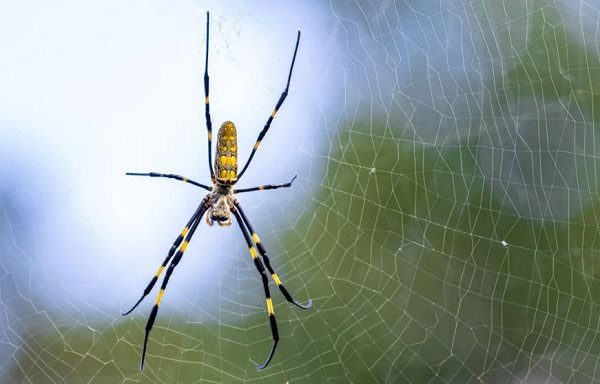Common spider species, like most creatures, typically cannot withstand the noise and wind from busy roads, but a study conducted by scientists at the Odum School of Ecology (University of Georgia) observed that the Joro spider seems to be quite indifferent to these factors. They are well-suited for development and expansion, particularly in urban areas, across the United States.
“Spider webs located near roads are constantly shaken and jostled. The roadside is truly a harsh environment for animals, yet Joro spiders thrive. This is unfortunate for America,” said Dr. Andy Davis, a member of the research team.
The Joro spider – scientifically known as Trichonephila clavata – was first discovered in the U.S. around 2013. An individual spider can grow up to 10 cm in length, about the size of a human hand.
In the study, Davis and his students used tuning forks to conduct 350 experiments simulating vibrations caused by prey caught in webs located along 20 roads. They predicted that road noise would impact hunting ability. However, the results showed that the hunting success of spiders living along roads with medium to high traffic only slightly decreased compared to those living along roads with low traffic. Specifically, the difference in attack rates was 51% to 65%.

Joro Spider – (Photo: CNN).
The manager of the Insect Division at the Smithsonian National Museum of Natural History, Floyd Shockley, commented: “This study helps us understand how far the Joro spider may spread. It seems they are not limited to the southern U.S. or just forests but will invade urban areas where interactions between spiders and humans increase.”
This expert was quite surprised that hunting ability in urban environments only decreased slightly, but he was not astonished that Joro spiders can endure vehicles and humans.
“They don’t care about us; they only care about the conditions we create that make it easier for them to catch prey,” said Shockley. Urban lighting attracts the type of insects that Joro spiders typically consume.
The research team is still unsure why Joro spiders are able to adapt better than many other spider species. Davis and his students hope to clarify this issue through further studies on the physiology of Joro spiders and their responses to stress.
Joro spiders are venomous, but their fangs cannot penetrate human skin. They feed on both harmful and beneficial insects in the environment.




















































